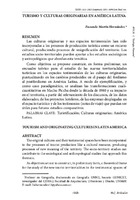Turismo y culturas originarias en América Latina
Abstract
Las culturas originarias y sus espacios testimoniales han sido incorporadas a los procesos de producción turística como un recurso cultural, produciendo procesos de resignificación del territorio. Los estudios socio-territoriales pueden aportar a los estudios sociológicos y antropológicos que abordan esta temática. Como objetivos se propone construir, en forma preliminar, un encuadre teórico para el estudio de las nuevas territorialidades turísticas en los espacios testimoniales de las culturas originarias, puntualizando en los cambios producidos en el pasaje del fordismo al postfordismo en América Latina. A modo de ejemplificación, y como caso paradigmático, se analizan las transformaciones cuali- cuantitativas en Machu Picchu desde la década de 1980 y su impacto en el territorio, a partir del relevamiento de los discursos, de los datos elaborados, de los proyectos hoteleros, de las empresas desplegadas en el espacio turístico y de los testimonios (notas de viaje) que puedan ser útiles para futuros estudios comparativos. The original cultures and their testimonial spaces have been incorporated to the processes of tourist production like a cultural resource, producing processes of new meaning of the territory. The socio-territory studies can contribute to the sociological and anthropological studies that approach this thematic. As objectives set out to construct, in preliminary form, a theoretical frame for the study of the new tourist territorialities in the testimonial spaces of the original cultures, emphasizing in the changes produced in the passage of the fordismo to the postfordismo in Latin America. As illustration approaches the cuali-quantitative transformations in Machu Picchu from the decade of 1980 and its impact in the territory, from the relief of the speeches, the processed data, the hotel projects, the companies unfolded in the tourist space and of the testimonies (trip notes) that can be useful for the comparative study.
Collections
- Revista Avá [359]




